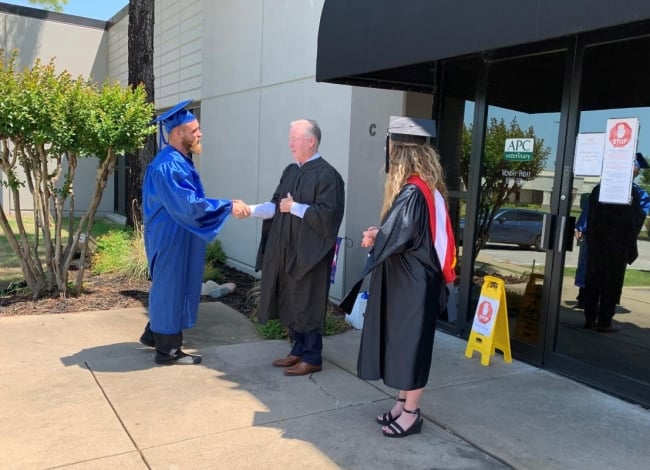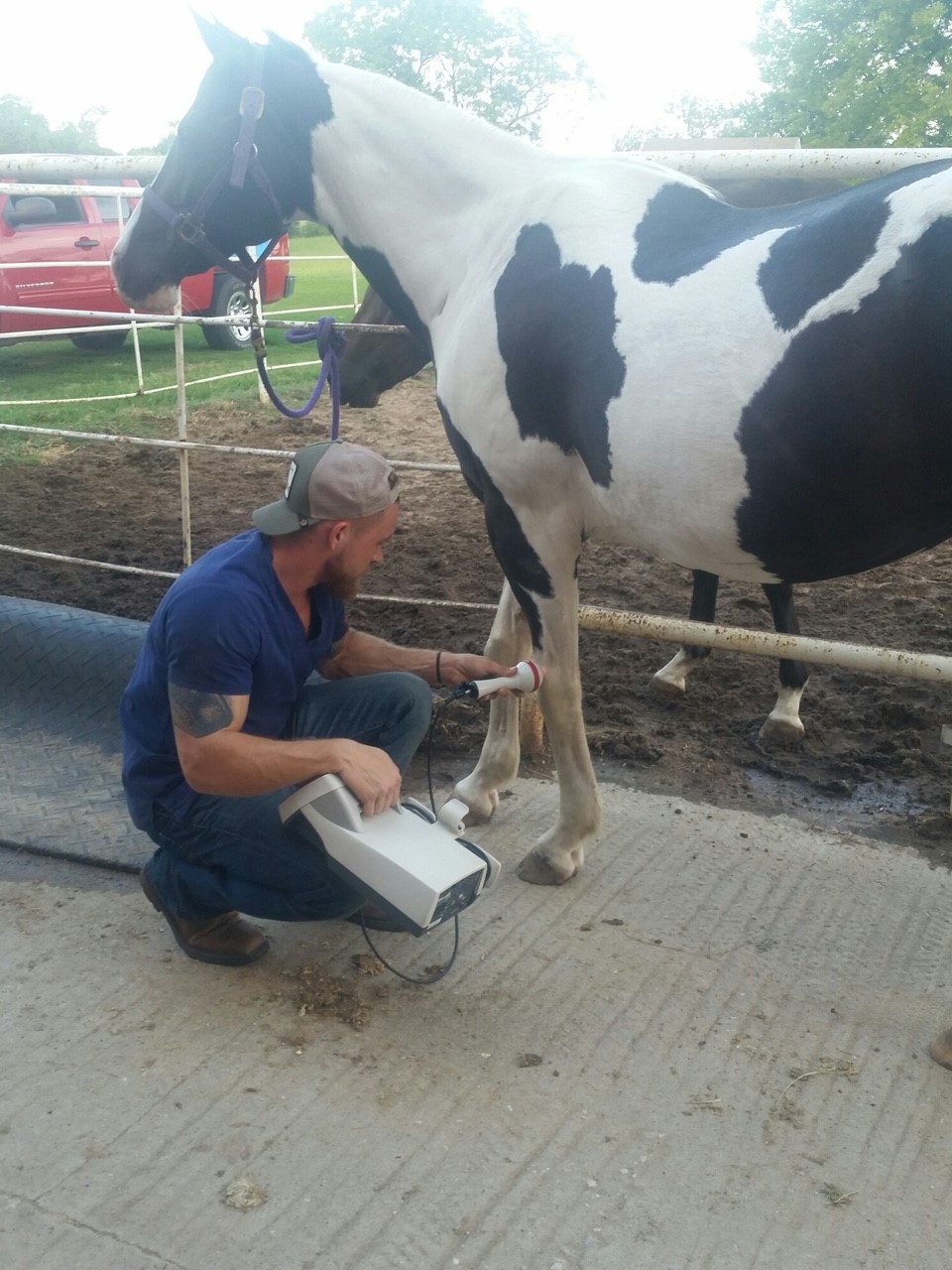You have /5 articles left.
Sign up for a free account or log in.

Shane Allen has a surprise graduation outside his workplace.
Courtesy Tulsa Community College
Shane Allen feels sick whenever he thinks about a class presentation he gave in 2013 during his spring semester at Tulsa Community College.
He was in the late stages of an opioid addiction at the time. In that state of mind, he thought it would be a good idea to bring a family friend's alligator for a presentation in his developmental composition course. The assignment was to present something related to what Allen wanted to study, which was zoology.
Allen let Rocky, about 4 feet long, out of his dog crate and proceeded to describe the different parts of the alligator. After class, he headed back to his truck, with Rocky in tow, and passed out in the parking lot after using more drugs.
The police were called, news reporters arrived and Allen was arrested for possession of drug paraphernalia and later charged. Rocky was taken to a local zoo and later returned to his owner; he is doing fine.
"I’m not a criminal, but I’m a drug addict," Allen said while recalling the unpleasant memories.
It wasn't Allen's first arrest, but it was a turning point in his life.
Now 28 and sober, Allen will be attending Oklahoma State University in the fall. He plans to attend veterinary school in the future.
Reaching this milestone did not go unheralded. A few faculty and staff members from the community college, along with Allen's parents, surprised him on May 22 when they showed up the vet clinic where he works and held an impromptu commencement ceremony for him. In the parking lot of the clinic, with his co-workers also looking on, Allen put on his cap and gown and then walked down the sidewalk to "Pomp and Circumstance" before receiving his diploma from two staff members from the college.
At a time when so much focus in higher ed is on the pandemic and all that can go wrong, Allen's achievement was a welcome opportunity for his supporters to focus on what went right.
Allen credits the community college and its staff and faculty members for giving him a second chance at life.
Worth Taking a Chance
When Allen appeared in court after his arrest, the judge in his case sentenced him to a minimum-security prison and ordered him to enroll in a regimented drug treatment program. If he did well in the program, Allen would be released early on probation after about one year in prison.
He did well and was released in 2014. His probation is scheduled to end in August.
Heather Hancock remembers Allen begging her for help after his arrest. Hancock was dean of students at the college's southeast campus at the time and was tasked with figuring out what to do with the alligator after the college's provost discovered it in the parking lot where Allen had passed out.
Allen wanted Hancock to help get the criminal charges against him and the suspension from the college dropped.
"I’ve been doing this a really long time, and I could just see on his face that he was hurting in a way that was very severe, and I could tell he was an addict," she said. "He was begging me to drop all of this … I just couldn’t waver, because I knew if I did, he was going to die."
Hancock, who is now the Title IX coordinator and director of civil rights compliance for the entire college, suspended Allen for two years. He called her throughout his time in prison saying he wanted to return to college, she said.
"I said, 'I would probably let you back, but you have to show me you’ll be a good person in our community,'" she said.
The counselor Allen saw while in prison told Hancock that Allen probably shouldn't go back to college right away because he had to first readjust to life outside prison.
Hancock told Allen that as a condition of being allowed to re-enroll, he would have to meet with her every week to discuss his academic progress and any hurdles he encountered. She assumed he wouldn't want to spend his time meeting with her, but Allen agreed and enrolled in Tulsa the spring after his release from prison. He spent about six years attending college part-time while working full-time.
"He struggled, but we talked about it," she said. "It wasn’t an easy route, but I just kept saying, 'Stick it out.'"
Hancock said she usually sees students on their worst days in her role as a conduct officer. She's learned that students have to decide if they want to change before she can help them.
When she showed Allen she wasn't angry at him and that she wanted him to succeed, she saw he was going to take the opportunity to return to college and pursue a better life.
"There was just something about Shane -- he has such a great heart," she said. "I just thought, this is a kid worth taking a chance on. There were many times where, even for me, maybe I would’ve given up. But he just kept fighting a little bit at a time."
Hancock believes being suspended from the college, going to prison and entering the treatment program saved Allen's life.
Don't Quit
Allen now understands that he used drugs in high school and college to cope with problems in his life. He was bullied in elementary and middle school for his love of "unlovable" animals, such as snakes and alligators, and pressured in high school to try marijuana. His parents' divorce caused tension in his family life. Allen was close to his father, and it hurt to see his parents separate.
Allen eventually turned to opiates and began the downward slide that would lead to his suspension from college and arrest. Many students in his high school in Oklahoma were using drugs, he said.
"The only thing that I really knew was getting high," he said. He felt better about his life when he did.
Things got worse in 2011; Allen's best friend died from a drug overdose.
 Allen said his one-year stint in prison finally gave him the opportunity to process the things he had been through. He also realized how his addiction had affected those who cared about him.
Allen said his one-year stint in prison finally gave him the opportunity to process the things he had been through. He also realized how his addiction had affected those who cared about him.
"When I was kid, all I wanted to do was be Steve Irwin, and I lost that to drugs. I lost that because I wanted to fit in," he said, referencing the late wild animal activist and television personality. "I finally made a promise to myself and to my parents that I would never in my life return to that."
Consistently reaching out to Hancock made all the difference, he said. His regular meetings with her, as well as Narcotics Anonymous meetings, helped him persevere. He also loved his college courses.
Allen is nervous about his next steps, but he's grateful for how far he's come. He's been able to work at vet clinics while attending college, and just bought a house near Oklahoma State. He aspires to go to vet school and then work with exotic animals, perhaps in a zoo.
He's indebted to the community college for giving him a chance.
"People stuck their neck out when they didn’t have to," he said.
Hancock knows that Allen is scared, but she also believes he can continue to overcome the hurdles he faces. She was among the supporters who attended his parking lot graduation.
"I've not done this -- he's done this," she said.
She also believes his story will encourage others who are struggling to keep going. Allen also hopes that what he went through will help others avoid his mistakes, or find the courage to overcome their own struggles.
"Find something that you love," he said. "Life’s short -- don’t quit on that."








